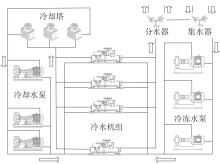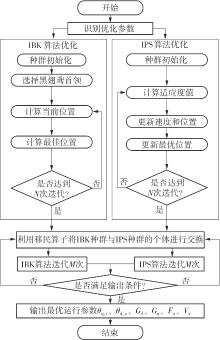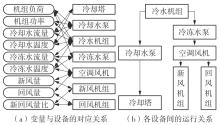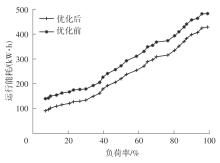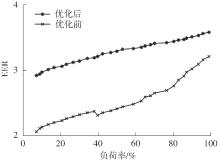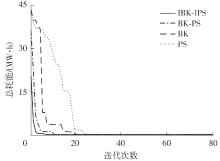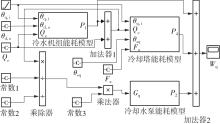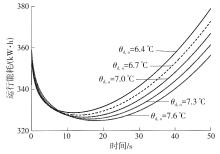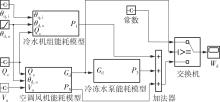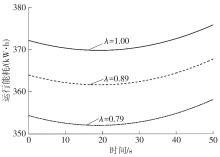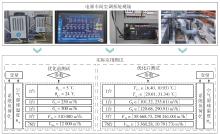Journal of South China University of Technology(Natural Science Edition) ›› 2025, Vol. 53 ›› Issue (7): 80-92.doi: 10.12141/j.issn.1000-565X.240412
• Electronics, Communication & Automation Technology • Previous Articles Next Articles
An Energy-Saving Optimization Method of Air-Conditioning System for Electric Drive Workshop Based on IBK-IPS Algorithm
GONG Xiaorong, WANG Xin, XIONG Weiqing, WANG Tangliang, ZHANG Hongming
- College of Mechanical Engineering,Chongqing University of Technology,Chongqing 400054,China
-
Received:2024-08-22Online:2025-07-25Published:2024-12-13 -
Contact:熊维清(1996—),女,博士,讲师,主要从事空调系统节能优化研究。 E-mail:wq.xiong@cqut.edu.cn -
About author:龚小容(1986—),女,博士,副教授,主要从事空调系统建模及优化控制研究。E-mail: gxr@cqut.edu.cn -
Supported by:the National Natural Science Foundation of China(52405532);the Natural Science Foundation of Chongqing City(CSTB2024NSCQ-MSX0425);the Science and Technology Research Program of Chongqing Municipal Education Commission(KJQN202401136)
CLC Number:
Cite this article
GONG Xiaorong, WANG Xin, XIONG Weiqing, WANG Tangliang, ZHANG Hongming. An Energy-Saving Optimization Method of Air-Conditioning System for Electric Drive Workshop Based on IBK-IPS Algorithm[J]. Journal of South China University of Technology(Natural Science Edition), 2025, 53(7): 80-92.
share this article
Table 1
Parameters of equipment for electric drive workshop air-conditioning system"
| 设备名称 | 参数名称 | 参数值 | 台数 | |
|---|---|---|---|---|
| 单台设备 | 总体 | |||
| 冷水机组 | 制冷量/kW | 217 | 1 953 | 9 |
| 功率/kW | 40.0 | 360.0 | ||
| 冷却水泵 | 流量/(m3‧h-1) | 300 | 900 | 3 |
| 功率/kW | 20.0 | 620.0 | ||
| 冷冻水泵 | 流量/(m3‧h-1) | 250 | 750 | 3 |
| 功率/kW | 15.0 | 415.0 | ||
| 冷却塔 | 流量/(m3‧h-1) | 300 | 900 | 3 |
| 风量/(m3‧h-1) | 103 333.00 | 310 000.00 | ||
| 功率/kW | 12.0 | 36.0 | ||
| 空调风机 | 流量/(m3‧h-1) | 16 | 1 216 | 76 |
| 风量/(m3‧h-1) | 157.89 | 12 000.00 | ||
| 功率/kW | 1.5 | 114.0 | ||
Table 2
Optimization results of operating parameters of the air-conditioning system in electric drive workshop under different loads"
| Qe/kW | θsq/℃ | θd,o/℃ | Gd/(m3‧h-1) | θq,i/℃ | Gq/(m3‧h-1) | F3a/(m3‧h-1) | V76a/(m3‧h-1) | Wo/(kW·h) | Wo0/(kW·h) | λ/% |
|---|---|---|---|---|---|---|---|---|---|---|
| 15.38 | 33.05 | 10.93 | 101.32 | 29.98 | 120.68 | 58 668.73 | 3 360.28 | 91.46 | 140.02 | 34.68 |
| 19.21 | 26.97 | 10.78 | 105.00 | 29.56 | 125.77 | 60 452.14 | 3 420.67 | 96.21 | 142.64 | 32.55 |
| 21.69 | 40.98 | 10.54 | 108.00 | 29.74 | 131.75 | 63 356.00 | 3 990.42 | 102.63 | 150.51 | 31.81 |
| 29.07 | 36.60 | 10.09 | 101.00 | 30.01 | 133.86 | 142 209.74 | 4 000.63 | 109.80 | 154.80 | 29.07 |
| 35.73 | 25.99 | 10.01 | 106.15 | 30.00 | 137.71 | 162 688.85 | 4 371.26 | 115.76 | 162.84 | 28.91 |
| 44.92 | 25.75 | 9.78 | 107.00 | 30.20 | 151.36 | 170 000.00 | 4 580.04 | 121.08 | 167.42 | 27.68 |
| 50.02 | 28.13 | 9.61 | 109.00 | 30.08 | 165.69 | 180 261.00 | 5 300.25 | 127.82 | 175.22 | 27.05 |
| 57.80 | 28.98 | 9.55 | 111.00 | 29.65 | 168.01 | 185 262.17 | 5 824.57 | 130.04 | 177.50 | 26.74 |
| 65.12 | 38.18 | 9.40 | 118.37 | 30.00 | 170.18 | 190 768.50 | 6 035.25 | 134.25 | 179.24 | 25.10 |
| 74.18 | 28.25 | 9.40 | 125.56 | 30.90 | 179.37 | 190 261.00 | 6 277.21 | 149.63 | 193.10 | 22.51 |
| 82.24 | 37.23 | 9.35 | 134.26 | 30.04 | 186.32 | 200 716.74 | 6 450.25 | 162.00 | 205.66 | 21.23 |
| 86.17 | 39.03 | 9.13 | 153.55 | 29.89 | 193.26 | 210 663.50 | 6 625.46 | 179.37 | 226.71 | 20.88 |
| 91.89 | 40.83 | 9.02 | 167.65 | 29.70 | 200.21 | 220 611.00 | 6 973.72 | 192.74 | 241.35 | 20.14 |
| 101.42 | 30.13 | 8.86 | 171.66 | 30.54 | 205.36 | 227 143.61 | 7 321.98 | 206.11 | 257.00 | 19.80 |
| 108.51 | 28.13 | 8.71 | 174.45 | 30.69 | 207.16 | 230 558.51 | 7 670.24 | 220.48 | 272.40 | 19.06 |
| 115.08 | 28.79 | 8.56 | 179.59 | 29.01 | 211.87 | 238 675.27 | 7 862.44 | 237.85 | 292.56 | 18.70 |
| 127.41 | 31.11 | 8.45 | 183.47 | 30.00 | 214.10 | 240 506.69 | 8 018.49 | 254.22 | 310.93 | 18.24 |
| 136.73 | 28.89 | 8.36 | 187.67 | 30.64 | 218.56 | 242 456.07 | 8 366.75 | 271.06 | 330.44 | 17.97 |
| 141.06 | 33.54 | 8.20 | 190.57 | 30.12 | 221.05 | 247 803.25 | 8 445.78 | 289.15 | 348.84 | 17.11 |
| 147.39 | 30.62 | 8.05 | 192.52 | 29.87 | 228.00 | 250 062.52 | 8 525.48 | 296.59 | 355.07 | 16.47 |
| 152.02 | 35.35 | 8.04 | 196.52 | 30.02 | 234.94 | 253 476.87 | 8 634.62 | 308.96 | 368.03 | 16.05 |
| 166.04 | 28.54 | 7.90 | 199.57 | 30.18 | 241.89 | 258 453.50 | 8 715.01 | 315.57 | 373.63 | 15.54 |
| 174.37 | 33.42 | 7.70 | 202.35 | 30.06 | 248.83 | 260 401.00 | 9 063.26 | 334.63 | 393.31 | 14.92 |
| 179.70 | 34.36 | 7.61 | 203.13 | 31.34 | 255.78 | 265 832.81 | 9 480.52 | 351.52 | 409.60 | 14.18 |
| 186.02 | 36.57 | 7.41 | 208.34 | 29.82 | 262.73 | 268 793.05 | 9 759.78 | 370.33 | 428.87 | 13.65 |
| 189.05 | 40.13 | 7.30 | 214.63 | 29.65 | 269.67 | 271 034.26 | 10 108.03 | 382.71 | 440.30 | 13.08 |
| 195.28 | 29.64 | 7.10 | 219.47 | 30.89 | 276.62 | 275 473.35 | 10 259.25 | 398.08 | 457.04 | 12.90 |
| 202.68 | 29.24 | 7.01 | 227.30 | 29.76 | 283.56 | 284 366.00 | 10 547.26 | 406.52 | 463.75 | 12.34 |
| 208.00 | 28.48 | 6.71 | 231.04 | 30.01 | 286.18 | 287 261.00 | 10 680.89 | 424.75 | 481.69 | 11.82 |
| 215.00 | 28.26 | 6.40 | 235.61 | 31.23 | 290.91 | 290 261.00 | 10 791.73 | 428.43 | 482.63 | 11.23 |
Table 3
Comparison of operating parameters of the air-conditioning system in electric drive workshop before and after optimization"
| 运行参数 | 原始值 | 优化值 |
|---|---|---|
| 冷冻水出水温度/℃ | [ | [6.40,10.93] |
| 冷冻水泵流量/(m3‧h-1) | [100,250] | [101.32,235.61] |
| 冷却水进水温度/℃ | [24,32] | [29.01,31.34] |
| 冷却水泵流量/(m3‧h-1) | [120,300] | [120.68,290.91] |
| 冷却塔风机风量/(m3‧h-1) | [0,310 000] | [58 668.73,290 261.00] |
| 空调风机风量/(m3‧h-1) | [0,12 000] | [3 360.28,10 791.73] |
Table 4
Comparison of energy saving optimization results among PS, BK, BK-PS and IBK-IPS algorithms"
| 需求负荷 | 空气湿球 温度/℃ | Wo/(kW·h) | 节能效果/(kW·h) | ||||||
|---|---|---|---|---|---|---|---|---|---|
| 数值/kW | 占比/% | PS | BK | BK-PS | IBK-IPS | Wo(IBK-IPS)-Wo(PS) | Wo(IBK-IPS)-Wo(BK) | Wo(IBK-IPS)-Wo(BK-PS) | |
| 21.69 | 10 | 40.98 | 131.67 | 124.02 | 115.84 | 102.63 | -29.04 | -21.39 | -13.21 |
| 65.12 | 30 | 38.18 | 142.02 | 139.72 | 137.29 | 134.25 | -7.77 | -5.47 | -3.04 |
| 108.51 | 50 | 28.13 | 270.38 | 253.87 | 237.28 | 220.48 | -49.90 | -33.39 | -16.80 |
| 152.02 | 70 | 35.35 | 361.33 | 342.10 | 325.74 | 308.96 | -52.37 | -33.14 | -16.78 |
| 195.28 | 90 | 29.64 | 442.18 | 428.69 | 416.77 | 398.08 | -44.10 | -30.61 | -18.69 |
| [1] | ZHAO Y, LI W, ZHANG J,et al .Real-time energy consumption prediction method for air-conditioning system based on long short-term memory neural network[J].Energy and Buildings,2023,298:113527/1-13. |
| [2] | LU S, QI Y, CAI Z,et al .Optimization model analysis of centralized groundwater source heat pump system in heating season[J].Frontiers in Energy,2015,9:343-361. |
| [3] | LI S, CHEN X, BU L,et al .Two-stage optimization for the air conditioning system in public buildings with flexible control of indoor load[J].Energy and Buildings,2024,312:114162/1-13. |
| [4] | CEN J, ZENG L, LIU X,et al .Research on energy-saving optimization method for central air conditioning system based on multi-strategy improved sparrow search algorithm [J].International Journal of Refrigeration,2024,160:263-274. |
| [5] | 叶灿滔,马伟斌,刘金平,等 .基于谐波反应法的净化空调系统节能研究[J].华南理工大学学报(自然科学版),2013,41(12):81-89. |
| YE Can-tao, MA Wei-bin, LIU Jin-ping,et al .Study on energy saving of purified air conditioning system based on harmonic response method[J].Journal of South China University of Technology (Natural Science Edition),2013,41(12):81-89. | |
| [6] | ZHAO J, LIU D, YUAN X,et al .Model predictive control for the ice-storage air-conditioning system coupled with multi-objective optimization[J].Applied Thermal Engineering,2024,243:122595/1-19. |
| [7] | 刘金平,卢智涛,刘雪峰,等 .基于次优化解群的冷冻水泵组全年能耗评价方法[J].华南理工大学学报(自然科学版),2015,43(7):106-117. |
| LIU Jin-ping, LU Zhi-tao, LIU Xue-feng,et al .An evaluation method of annual energy consumption of chilled water pumps group based on suboptimal solutions[J].Journal of South China University of Technology (Natural Science Edition),2015,43(7):106-117. | |
| [8] | YANG J, WU J, XIAN T,et al .Research on energy-saving optimization of commercial central air-conditioning based on data mining algorithm[J].Energy and Buildings,2022,272:112326/1-15. |
| [9] | 杨秀,刘欣雨,孙改平,等 .基于改进粒子群算法的中央空调系统节能优化控制[J].电力科学与技术学报,2023,38(3):65-75,93. |
| YANG Xiu, LIU Xinyu, SUN Gaiping,et al .Energy-saving optimization control of central air-conditioning system based on improved particle swarm algorithm[J].Journal of Electric Power Science and Technology,2023,38(3):65-75,93. | |
| [10] | 闫军威,黄琪,周璇 .基于Double-DQN的中央空调系统节能优化运行[J].华南理工大学学报(自然科学版),2019,47(1):135-144. |
| YAN Junwei, HUANG Qi, ZHOU Xuan .Energy-saving optimization operation of central air-conditioning system based on double-DQN algorithm[J].Journal of South China University of Technology (Natural Science Edition),2019,47(1):135-144. | |
| [11] | TU M, HUANG H, LIU Z H,et al .Factor analysis and optimization of operational parameters in a liquid desiccant air-conditioning system[J].Energy,2017,139:767-781. |
| [12] | 周璇,莫浩华,闫军威 .基于改进H-AC算法的冷源系统节能优化控制策略[J].华南理工大学学报(自然科学版),2025,53(1):21-31. |
| ZHOU Xuan, MO Haohua, YAN Junwei .Investigating an enhanced H-AC algorithm-based strategy for energy-saving optimization control in cold source system[J].Journal of South China University of Technology (Natural Science Edition),2025,53(1):21-31. | |
| [13] | LIU Q, CHENG X, SHI J,et al .Modeling and predicting energy consumption of chiller based on dynamic spatial-temporal graph neural network[J].Journal of Building Engineering,2024,91:109657/1-21. |
| [14] | CAI J, YANG H .Attention mechanism-aided model ensemble method of chiller energy consumption prediction[J].International Journal of Refrigeration,2024,165:111-121. |
| [15] | WANG H, WANG F, WANG C,et al .A prospective assessment of scale effects of energy conversion in ultra-low-head pumped hydro energy storage units[J].Energy Conversion and Management,2024,315:118798/1-22. |
| [16] | BARNIER M A, BOURRET B .Pumping energy and variable frequency drives[J].ASHRAE Journal,1999,41(12):37-40. |
| [17] | 王明伟,刘天天,高琦,等 .填料蒸发预冷进风的机械通风空冷塔设计及其运行性能[J].中国电力,2024,57(6):225-234. |
| WANG Mingwei, LIU Tiantian, GAO Qi,et al .Design and operating performance of mechanical draft dry cooling tower pre-cooled with wet medium[J].Electric Power,2024,57(6):225-234. | |
| [18] | 乔义友,方健珉,殷翔,等 .送风温度对车用跨临界CO2制冷系统影响的仿真研究[J].制冷学报,2022,43(4):96-102. |
| QIAO Yiyou, FANG Jianmin, YIN Xiang,et al .Simulation study on the effect of supply air temperature on vehicle transcritical CO2 refrigeration system[J].Journal of Refrigeration,2022,43(4):96-102. | |
| [19] | WANG J, WANG W, HU X,et al .Black-winged kite algorithm:a nature-inspired meta-heuristic for solving benchmark functions and engineering problems[J].Artificial Intelligence Review,2024,57:98/1-53. |
| [20] | JIANG M, FENG X, WANG C,et al .Robust color image watermarking algorithm based on synchronization correction with multi-layer perceptron and Cauchy distribution model[J].Applied Soft Computing,2023,140:110271/1-15. |
| [21] | BO Y, GUO X, LIU Q,et al .Prediction of tunnel deformation using PSO variant integrated with XGBoost and its TBM jamming application[J].Tunnelling and Underground Space Technology,2024,150:105842/1-20. |
| [1] | LIU Xuefeng, HUANG Bin, DING Liwei, et al. Multi-Variable Coupled Physical Model of Water-Cooled Centralized Air-Conditioning Cold Source System [J]. Journal of South China University of Technology(Natural Science Edition), 2024, 52(5): 139-152. |
| [2] |
YAN Junwei HUANG Qi ZHOU Xuan .
Energy-saving Optimization Operation of Central Air-conditioning System Based on Double-DQN Algorithm
|
| [3] | Ding Yun-fei, Ding Jing, Wang Zhuo-yue, et al. Removing of Moisture Load in Cooling Ceiling Air-conditioning System by Rotary Dehumidifier [J]. Journal of South China University of Technology(Natural Science Edition), 2004, 32(3): 10-14. |
| Viewed | ||||||
|
Full text |
|
|||||
|
Abstract |
|
|||||
